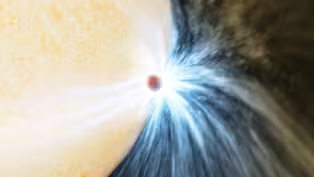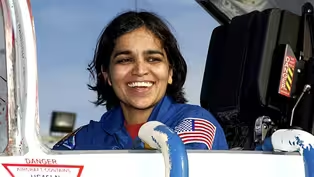
Erdogan’s control hangs in the balance in Turkey’s election
Clip: 5/14/2023 | 6m 11sVideo has Closed Captions
The significance of Turkey’s election as Erdogan’s control hangs in the balance
Turkey is counting the votes from Sunday’s election to see if President Erdogan will extend his two-decade hold on power. The election’s unified opposition represents the greatest political challenge yet to Erdogan’s increasingly authoritarian rule. Soner Cagaptay, director of the Turkish Research Program at the Washington Institute for Near East Policy, joins John Yang to discuss.
Problems playing video? | Closed Captioning Feedback
Problems playing video? | Closed Captioning Feedback
Major corporate funding for the PBS News Hour is provided by BDO, BNSF, Consumer Cellular, American Cruise Lines, and Raymond James. Funding for the PBS NewsHour Weekend is provided by...

Erdogan’s control hangs in the balance in Turkey’s election
Clip: 5/14/2023 | 6m 11sVideo has Closed Captions
Turkey is counting the votes from Sunday’s election to see if President Erdogan will extend his two-decade hold on power. The election’s unified opposition represents the greatest political challenge yet to Erdogan’s increasingly authoritarian rule. Soner Cagaptay, director of the Turkish Research Program at the Washington Institute for Near East Policy, joins John Yang to discuss.
Problems playing video? | Closed Captioning Feedback
How to Watch PBS News Hour
PBS News Hour is available to stream on pbs.org and the free PBS App, available on iPhone, Apple TV, Android TV, Android smartphones, Amazon Fire TV, Amazon Fire Tablet, Roku, Samsung Smart TV, and Vizio.
Providing Support for PBS.org
Learn Moreabout PBS online sponsorshipJOHN YANG: Good evening, Iúm John Yang.
In Turkey, officials are counting the votes from todayús election to see a President Recep Tayyip Erdogan will continue his two decade hold on power.
The state run news agency indicates that Erdogan may be headed for a runoff in two weeks.
The election with a unified opposition represented the greatest political challenge yet to Erdoganús increasingly authoritarian rule.
The Challenger Kemal Kilicdaroglu narrowly led Erdogan in pre-election surveys.
Heús a retired civil servant and ran on the promise of restoring democracy which Erdogan had eroded.
Some Turkish voters went to the polls today in mood for change.
MURAT KACMAZ, Ankara Resident (through translator): For me, this feels like a parting of ways I donút know how to describe it.
I canút think of a more important election.
JOHN YANG: While we await the final vote count we turn to Soner Cagaptay, whoús head of the Turkish research program at the Washington Institute for Near East Policy.
His most recent book is "A Sultan in Autumn: Erdogan Faces Turkeyús Uncontainable Forces."
To use your terms, what are the uncontainable forces that are driving her to want to run off tonight?
SONER CAGAPTAY, THE WASHINGTON INSTITUTE FOR NEAR EAST POLICY: I would say that economy is his Achilles heel Iran has won elections until recently on a platform was slowing economic growth.
And heús never won elections while not delivering growth.
At the same time, he came pretty close to clinching victory this time.
So, economy was a big factor going in to the elections for him and the earthquake should have hurt his popularity.
Aid agencies were nowhere to deliver aid after this devastating and sad earthquake.
But his strength is his information control or control over information flow rather.
In the last half a decade, Erdogan has eliminated autonomy of many of Turkeyús institutions, from courts to foreign ministry to the central bank, with grave ramifications for countryús economy foreign policy, but also electoral boards and media.
90 percent of the media is aligned with them and 80 percent of Turkeys citizens cannot read languages other than Turkish.
So you can curate reality.
And in the run up to these elections, citizens did not hear about inflation, human rights abuses, journalists and politicians in jail or relief agencies that failed to provide aid after the earthquake.
But how Erdogan has made Turkey a great military industrial power.
He repeated this argument over and over in the media, given that a large majority of citizens basically read the news that he curated.
So I think this is the first election won in the world, Erdogan being the inventor of nativist populist politics in this century globally, the first election won on a platform of post truth narrative, meaning you spread lies, you repeat them so much that they become reality, and you win elections based on that.
And people forgot that these lives to begin with.
JOHN YANG: This election is being closely watched in western capitals, here in Washington and at the Kremlin.
Why -- whatús it stake for those parties?
SONER CAGAPTAY: A lot is at stake.
Turkey is a second largest military, NATO, it borders Iran, Iraq, Syria.
It plays a role in the war in Ukraine.
Vladimir Putin decided last year that he wanted Erdogan want to win.
As the economy in Turkey went into problems and hyperinflation under Erdoganús large amounts of cash was transferred from Russia to Turkey, Erdogan handed these out in the form of very generous social security benefits, as well as cheap natural gas from Russia that he basically gave free to voters in the run up to elections.
And I think that helped perhaps put him close to the finishing line.
Putin wants Erdogan to win because Erdogan is like-minded leader that helps Putin challenge the U.S. led liberal international order.
So I think Putin is quite happy tonight that Erdogan did not lose.
We have a runoff likely in two weeks, and Putin will continue to support Erdogan financially and through information operations, because he cannot afford to see Erdogan lose when heús not winning himself in Ukraine.
JOHN YANG: And tell us about the opponent heús going to face in the runoff Kilicdaroglu.
How much of his strength tonight is support for him how much is an opposition to Erdogan?
SONER CAGAPTAY: Absolutely, Kilicdaroglu is a soft spoken politician opposite of Erdogan.
Erdogan is a populace.
He demonizes and brutalizes and cracks down on demographics unlikely to vote for him.
Kilicdaroglu follow the campaign where he reached out across the aisle, tried to bridge Turkey traditional left, right split him being on the left side, of course.
And perhaps it worked.
He was able to unite opposition forces, but he couldnút really get to, I think the 50 percent margin.
And in this regard, I think Erdogan played a really masterful game.
Kilicdarogluús party was supported by a pro-Kurdish faction.
Erdogan branded this faction as quote unquote, terrorists.
And as I said, post truth narrative.
If you repeat a lie enough, many times it becomes reality.
I think some voters were convinced that support for Kilicdarogluús opposition Kurdish party meant support by terrorists factions, and he probably lost some support as a result of that.
JOHN YANG: If Erdogan wins the runoff or if it goes to the runoff, and Erdogan wins the runoff.
Do you think his assault on democracy will continue?
SONER CAGAPTAY: I have so far argue that Turkey is, you know, countries could be vegetables.
Iúve said that Turkey is the onion, why?
The analytically onion because it doesnút have a core.
You peel it you think you got to the core and itús not there.
So taking that analogy, I always argued that Turkey is not an autocracy, not a democracy.
It is a democracy that has fallen under an autocrat.
Itús trying to make a comeback.
It didnút succeed quiet will seem to run off what happens.
If Erdogan wins again, I think Turkey will become a complete autocracy.
The remaining institutions that have maintained their autonomy will fold under him, the few courts and others.
The last vestiges of rule of law will disappear.
Erdogan wall will become a anointed as the countryús new sultan, educated Turks and youth will flee the country having up any given up any hope that lost hope that he can be voted out.
And I think that unfortunately, Turkey will descend into deeper autocracy.
JOHN YANG: Soner Cagaptay, thank you very much.
SONER CAGAPTAY: Itús my pleasure, thank you.
A look at celestial events thrilling scientists this month
Video has Closed Captions
Clip: 5/14/2023 | 6m 5s | A closer look at the novel celestial events thrilling scientists this month (6m 5s)
Remembering Kalpana Chawla, first Indian American in space
Video has Closed Captions
Clip: 5/14/2023 | 2m 22s | Remembering Kalpana Chawla, the first Indian American to go to space (2m 22s)
Why many women with Parkinson’s are misdiagnosed
Video has Closed Captions
Clip: 5/14/2023 | 6m 19s | Why women with Parkinson’s are misdiagnosed more often than men (6m 19s)
Providing Support for PBS.org
Learn Moreabout PBS online sponsorship
- News and Public Affairs

FRONTLINE is investigative journalism that questions, explains and changes our world.

- News and Public Affairs

Amanpour and Company features conversations with leaders and decision makers.












Support for PBS provided by:
Major corporate funding for the PBS News Hour is provided by BDO, BNSF, Consumer Cellular, American Cruise Lines, and Raymond James. Funding for the PBS NewsHour Weekend is provided by...


